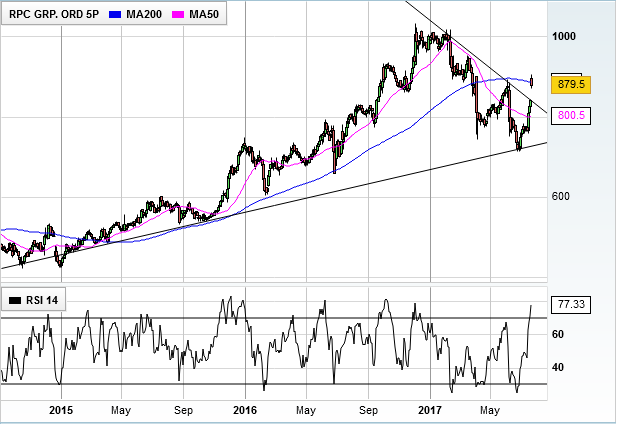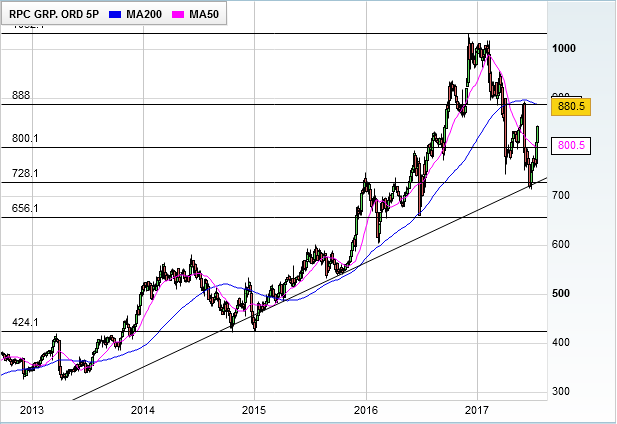Why RPC's now set for 40% gains
19th July 2017 13:42
by David Brenchley from interactive investor
Share on
Investors are back on side, after an unscheduled first-quarter trading update from , the maker of packaging for food, healthcare and household products, was packed with good news. After hitting an all-time high late last year, sentiment has cooled in 2017 so far and the packaging firm is down 15% year-to-date.
Looking behind the reasons for its de-rating reveals some intriguing details. Pim Vervaat took over as chief executive four years ago and embarked on a highly acquisitive programme that has seen RPC buy six businesses since the start of 2015 - and more before that.
This included £300 million on Promens and just over £500 million on Letica. All have been funded by rights issues, leading to many of their investor base owning too many RPC shares relative to their other portfolio holdings, according to a report by US-based investor forum Value Investors Club.
A "substantial de-risking in RPC shares and a material de-rating of the valuation of the company" ensued, followed by an attack from Aviate, a broker subsidiary of asset manager Northern Trust, urging clients to short the stock.
Value Investors Club's report suggests the bear case is "misguided" and claimed, in early June, the stock was worth 50-80% more than the 770p it was then trading at.

Since then, shares have re-rated and they broke the downtrend Wednesday, after first-quarter numbers were up on last year. Broker Credit Suisse reckons revenue (£960 million for Q1) looks on course to exceed its first-half forecast of £1.86 billion.
Elsewhere, group margins and profitability are well ahead of management expectations. It benefited from continued organic growth, the contribution from acquisitions and positive foreign exchange movements.
But RPC also addressed issues that have combined to move the stock to a level they say "significantly undervalues the performance to date and the group's future prospects". It has now announced a share buyback programme of up to £100 million and says it will make no more significant acquisitions in the current financial year.
Analysts broadly see the buyback as beneficial to shareholders and do not believe it will impact on RPC's ability to pay dividends. RPC has grown its dividend for 24 consecutive years and its forecast yield for 2018 is 3%. This is "a tradition we believe the company intends to maintain", says Credit Suisse analyst Lars Kjellberg.
Aviate also criticised the company for poorly designed management incentives and RPC says it will review both its annual bonus and long-term incentive plans to focus more on returns on capital and cash flow generation.
Vervaat says: "The board is confident that the group's performance going forward will continue to deliver value to its shareholders."
It's hard to argue with the boss's track record. Since he took over in May 2013, RPC's enterprise value has almost trebled, from £1.5 billion to £4.3 billion. Sales have increased from £1 billion to £3.6 billion and the share price is up 155%.

Across the board, brokers are positive on prospects for the stock, a defensive staple that we backed to deliver for shareholders after the UK voted to leave the European Union. Since then, despite its travails, the stock is up by a quarter.
JPMorgan now tips it up to 1,250p by June 2018, potential upside of 43%. While operating profit estimates stay unchanged, analyst Alexander Mees ticks earnings per share (EPS) forecasts up by 1% for the next three years.
Credit Suisse, Deutsche Bank, Numis and Jefferies are all in the same ball park regarding valuation, slightly below JPMorgan at 1,130p-1,180p.
All four say the stock looks "cheap", trading on a forward price/earnings (PE) ratio of just over 12 times.
That's a discount to peers both on the continent - including Amcor, and - and in the UK - like , , and - according to Jefferies analyst Justin Jordan, despite offering 3% organic growth and a full-year contribution of recent M&A and synergies.
"We believe improved RPC disclosure and cash focus can catalyse a re-rating," Jordan adds.
This article is for information and discussion purposes only and does not form a recommendation to invest or otherwise. The value of an investment may fall. The investments referred to in this article may not be suitable for all investors, and if in doubt, an investor should seek advice from a qualified investment adviser.